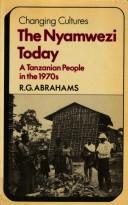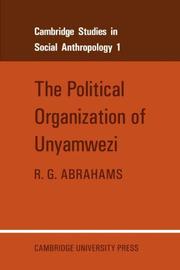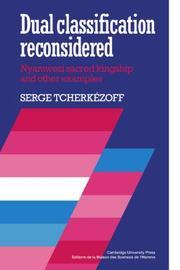| Listing 1 - 3 of 3 |
Sort by
|

ISBN: 0521226945 0521296196 Year: 1981 Publisher: Cambridge University
Abstract | Keywords | Export | Availability | Bookmark
 Loading...
Loading...Choose an application
- Reference Manager
- EndNote
- RefWorks (Direct export to RefWorks)
Nyamwezi --- Nyamwezi (African people) --- Nyamwezi (African people). --- Banyamwezi (African people) --- Wanyamwezi (African people) --- Bantu-speaking peoples --- Ethnology

ISBN: 0511557566 0521040019 0521040590 Year: 1967 Publisher: Cambridge : Cambridge University Press,
Abstract | Keywords | Export | Availability | Bookmark
 Loading...
Loading...Choose an application
- Reference Manager
- EndNote
- RefWorks (Direct export to RefWorks)
A detailed study of the political organization in an important area of Tanzania shortly before Independence. Unyamwezi covers 35,000 square miles and has a population of 400,000. Dr Abrahams outlines the social and economic framework and examines the origins of the modern political system. He then discusses the internal organization of Nyamwezi chiefdoms and villages and the emergence of national politics. The theoretical and comparative implications of the study, which is based on extensive field work in the area, are also considered.
Nyamwezi (African people) --- Banyamwezi (African people) --- Nyamwezi --- Wanyamwezi (African people) --- Bantu-speaking peoples --- Ethnology --- Arts and Humanities --- Philosophy

ISBN: 0511753063 052130895X 0521105358 Year: 1987 Publisher: Cambridge : Cambridge University Press,
Abstract | Keywords | Export | Availability | Bookmark
 Loading...
Loading...Choose an application
- Reference Manager
- EndNote
- RefWorks (Direct export to RefWorks)
The deep structure of symbolism in religious and ritual activities has hitherto mostly been studied from perspectives deriving from classical and contemporary Western thought, which values symmetry, non-contradiction, equality of terms and the rationality of linear discourse and classification systems have therefore come to be defined in binary terms (right/left, male/female, black/white). In this book, Serge Tcherkezoff presents a new perspective on the study of ritual classification. On the basis of a detailed ethnography of the rituals of the Nyamwezi of Tanzania, Tcherkezoff argues for an analysis which recognised contradictions and asymmetry within ritual systems. Following Dumont, he shows that societies are characterised by a hierarchal structure of values, in which each individual element has a meaning only through its position within the whole, thereby replacing the rigid classical structuralist dichotomy with a rich multidimensional approach.
Nyamwezi (African people) --- Left and right (Symbolism) --- Folk classification. --- Duality (Logic) --- Logic --- Classification, Primitive --- Primitive classification --- Classification --- Ethnoscience --- Right and left (Symbolism) --- Symbolism --- Banyamwezi (African people) --- Nyamwezi --- Wanyamwezi (African people) --- Bantu-speaking peoples --- Ethnology --- Social Sciences --- Anthropology
| Listing 1 - 3 of 3 |
Sort by
|

 Search
Search Feedback
Feedback About UniCat
About UniCat  Help
Help News
News